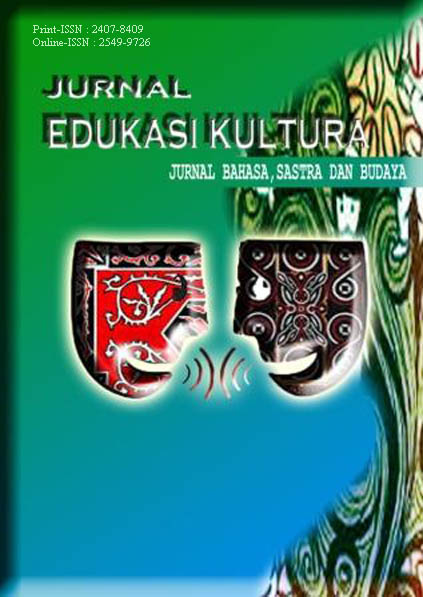Analisis Penerapan Materi ”To Be” dan unsur part of speech dalam pembelajarn bahasa inggris di sekolah dasar
DOI:
https://doi.org/10.24114/edukasikultura.v12i1.66245Abstract
This study aims to describe the English language teaching strategies at Public Elementary School 064037 Medan, focusing on basic materials such as to be, parts of speech, and vocabulary development. A descriptive qualitative approach was employed to observe methods, media, and the challenges faced by teachers and students. The findings indicate that the use of songs, games, visual media, and the integration of simple technology through WhatsApp and educational videos successfully enhance students’ motivation and language skills, particularly in pronunciation and vocabulary. Teachers’ creativity and parental support are also key factors In the success of English language teaching at the elementary level.References
Darmawan, F. (2017). The Eight Words: Parts Of Speech. Jakarta: Mitra Cendekia. https://opac.perpusnas.go.id/DetailOpac.aspx?id=1172390
Dewi, A. P., & Yusuf, M. (2021). Student Perceptions On Parts Of Speech After Taking Integrated English. BASIS: Jurnal Bahasa Dan Sastra Inggris, 9(2), 210–218. https://ejournal.upbatam.ac.id/index.php/basis/article/view/6349
Fitriani, D. (2021). Aktivitas Kelas Bahasa Inggris Di Sekolah Dasar Berdasarkan Pendekatan ”Whole Language”. Komposisi: Jurnal Pendidikan Bahasa Dan Sastra Indonesia, 22(2), 112–120. https://ejournal.unp.ac.id/index.php/komposisi/article/view/107248
Hidayati, D., & Anwar, F. (2022). Implementasi Pendidikan Karakter Dalam Pembelajaran Bahasa Inggris Di Kelas V SD. Jurnal Edukasi Riset, 10(2), 102–110. https://jer.or.id/index.php/jer/article/view/1453
Kurnia, S., & Rahman, H. (2022). Improving Students’ Ability To Identify Parts Of Speech Through Grammar Translation Method. Lentera Pendidikan, 25(2), 145–156. https://journal3.uin-alauddin.ac.id/index.php/lentera_pendidikan/article/view/16810
Lestari, A. R. (2023). Pengaruh Penggunaan Metode Bercerita Untuk Membantu Siswa Sekolah Dasar Memperluas Kosakata Bahasa Inggris. Edukatif: Jurnal Ilmu Pendidikan, 5(2), 450–457. https://edukatif.org/index.php/edukatif/article/view/6516
Lestari, W. (2021). Buku Saku The Parts Of Speech: Belajar Bahasa Inggris Praktis. Bandung: Edupress. https://www.google.co.id/books/edition/Buku_Saku_The_Parts_of_Speech/Z8kREAAAQBAJ
Mulyani, S. (2023). Analisis Penguasaan Kosakata Dalam Mata Pelajaran Bahasa Inggris Pada Siswa Kelas V SD Muhammadiyah Blora. Indonesian Journal Of English Studies, 8(1), 98–105. https://journal.upgris.ac.id/index.php/ijes/article/view/20630
Ramadhani, T. (2020). Pembelajaran Bahasa Inggris Menggunakan Metode English Is Fun Di Sekolah Dasar. Jurnal Karimah Tauhid, 6(1), 34–41. https://ojs.unida.ac.id/karimahtauhid/article/view/7819
Sugiyono. (2021). Metode Penelitian Kualitatif, Kuantitatif, Dan R&D (Edisi Revisi). Bandung: Alfabeta. https://opac.perpusnas.go.id/DetailOpac.aspx?id=1317239
Sulastri, L. (2022). Analisis Pembelajaran Kosakata Bahasa Inggris Di SDN 1 Tlogotirto Kabupaten Grobogan. Jurnal Janacitta, 11(1), 89–97. https://jurnal.unw.ac.id/index.php/janacitta/article/view/1672
Wahyuni, N. (2021). Analisis Kesulitan Belajar Kosakata Bahasa Inggris Pada Siswa Kelas II SD Negeri Duren Temanggung. Jurnal Pendidikan Dasar STKIP Andi Matappa, 9(1), 22–30. https://journal.stkip-andi-matappa.ac.id/index.php/dikdas/article/view/2873
Wibowo, A. (2016). Pentingnya Pendidikan Dalam Kehidupan Manusia. Yogyakarta: Pustaka Pelajar. https://opac.perpusnas.go.id/DetailOpac.aspx?id=1102760
Zubaedi. (2018). Pendidikan Karakter: Konsep Dan Aplikasi Dalam Dunia Pendidikan. Jakarta: Kencana. https://openlibrary.org/books/OL26713829M
Zulkarnain, M. (2023). Penguasaan Kosakata Bahasa Inggris Peserta Didik Di Sekolah Dasar. Jurnal Karimah Tauhid, 7(1), 55–63. https://ojs.unida.ac.id/karimahtauhid/article/view/7903
Downloads
Published
How to Cite
Issue
Section
License
Copyright (c) 2025 Maisyaroh Maisyaroh

This work is licensed under a Creative Commons Attribution 4.0 International License.

This work is licensed under a Creative Commons Attribution 4.0 International License
Authors who publish with this journal agree to the following terms:
- Authors retain copyright and grant the journal right of first publication with the work simultaneously licensed under Creative Commons Attribution 4.0 International License that allows others to share the work with an acknowledgement of the work's authorship and initial publication in this journal.
- Authors are able to enter into separate, additional contractual arrangements for the non-exclusive distribution of the journal's published version of the work (e.g., post it to an institutional repository or publish it in a book), with an acknowledgement of its initial publication in this journal.Penulis.
- Authors are permitted and encouraged to post their work online (e.g., in institutional repositories or on their website) prior to and during the submission process, as it can lead to productive exchanges, as well as earlier and greater citation of published work (Refer to The Effect of Open Access).



